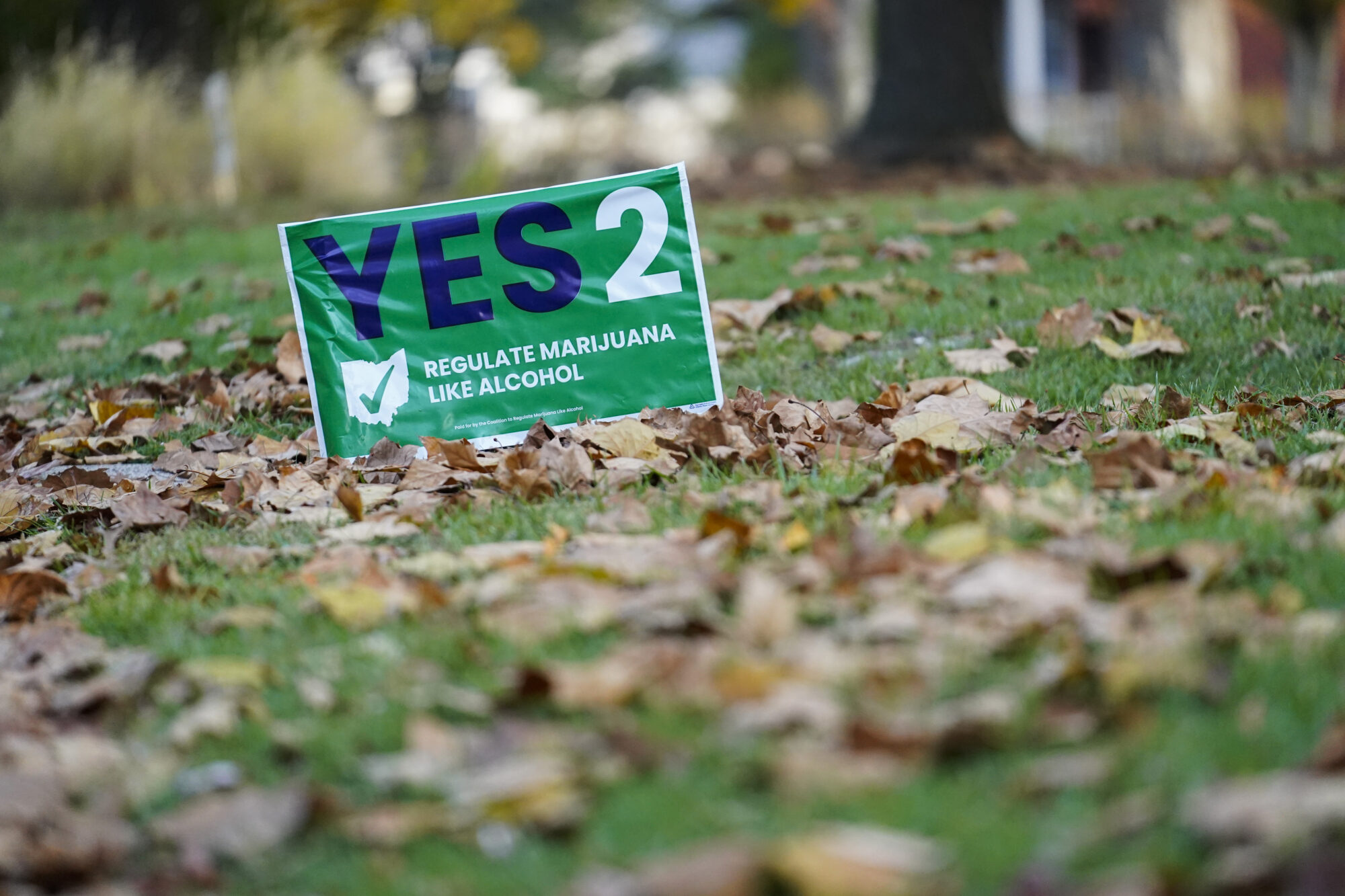After Ohioans Legalize Weed, GOP Leaders Already Want to Roll Back Key Reforms
Issue 2 has provisions to help people harmed by the war on drugs, but Republicans have called for reversing those and even redirecting new tax money to fund more jails and police.
Alex Burness | November 14, 2023


Morgan Fox, a native Ohioan who advocates against marijuana prohibition, feels voters spoke loudly in Tuesday’s election when, by a nearly 14-percentage-point margin, they approved Issue 2 to legalize and establish regulation of recreational cannabis possession, sales, cultivation, and manufacturing by people 21 and older.
“It’s been clear for more than a decade that Ohioans have wanted to regulate cannabis for adults,” Fox, political director of the National Organization for the Reform of Marijuana Laws, told Bolts. “This should be a wake-up call.”
Issue 2 is set to go into effect Dec. 7, with the first round of new business licenses to be announced by September. But the law comes with a crucial asterisk: it changes state statute, not the state constitution, so its approval at the ballot is essentially tantamount to Ohio voters passing a new piece of legislation just like Ohio lawmakers do. This means that those lawmakers can change the law back without voter consent. There is no limit on the extent to which the GOP-controlled state legislature can amend the 41-page initiative voters just supported; they could even outright repeal it.
Governor Mike DeWine and his fellow Republicans who run the legislature have stopped short of calling for total repeal, but even before Election Day, they had signaled their intent to make the law more restrictive if it passed. Now that it has, they’ve indicated they could make some changes as soon as in the next few weeks, ahead of the Dec. 7 effective date, while others may be a bit longer in the offing.
Fox is incredulous that these lawmakers would cross the electorate by messing much with a law 57 percent of voters just approved. “It would be political malpractice,” Fox said. “That being said, they don’t always do right by their constituents.”
Ohioans need look no further than another ballot measure that just passed—Issue 1, enshrining abortion rights in the state constitution—to see that their legislature is comfortable upending voter will: House Republicans on Friday issued a news release claiming that Issue 1 doesn’t actually affect the state’s existing abortion ban, and they vowed to continue enforcing abortion criminalization, in defiance of election results. These lawmakers even said that they would “consider removing jurisdiction from the judiciary” over the amendment—an extraordinary prospect. “No amendment can overturn the God-given rights with which we were born,” Republican state Representative Beth Lear said in that release.
These rapid threats come after Ohio Republicans earlier this year tried to torpedo the abortion measure by rushing a separate ballot measure to raise the threshold for passage of constitutional amendments from 50 to 60 percent. Ohioans rejected the measure in August, and Bolts reported at the time that these events were part of a long series of maneuvers by the Ohio GOP to undermine direct democracy.
Cat Packer, director of drug markets and legal regulation at the Drug Policy Alliance, now worries that cannabis regulation ushered in by Issue 2 could similarly be distorted by politicians. “I think there’s going to be this real disconnect with particularly GOP legislators wanting to overturn the will of the voters and make this, potentially, something that actually does the opposite of what the voters intended in trying to address some of the harms of the drug war, and may be used as a vehicle to double down on some of those harms,” she told Bolts.
GOP leaders of both Ohio legislative chambers have already confirmed they’ll consider reversing aspects of Issue 2 that sought to unwind drug-war policies, which have produced vastly disproportionate enforcement of marijuana laws against Black people in the state.
Issue 2 contains no provisions to automatically expunge the records of Ohioans who already have criminal convictions over marijuana. Other states have passed such a reform after legalization, but for now Ohio lawmakers seem more likely to loosen the measure’s other equity provisions than to strengthen them.
Senate President Matt Huffman has said that he takes issue with the amount of tax revenue that will be dedicated to promoting cannabis business opportunities for those most personally affected by prohibition.
As it stands, Issue 2 calls for a 10 percent tax on marijuana sales, with a plurality of the proceeds going toward a program meant to provide financial assistance and license application support to prospective cannabis business owners who demonstrate “both social and economic disadvantage” resulting from the historically racist and classist enforcement of marijuana laws. That includes people and family members of people who “have been arrested for, convicted of, or adjudicated delinquent for a marijuana-related offense,” the law states.
Instead, some Republican leaders have signaled they want the tax money to serve very different purposes. Speaker Jason Stephens told local media that the legislature should allocate tax revenue from cannabis sales to fund jail construction and law enforcement training.
His remarks have alarmed people who worked to pass Issue 2 in Ohio, who say that a main reason they sought the initiative was to reduce incarceration and criminalization stemming from drug charges. FBI data show Ohio has arrested at least 5,700 people in each of the past three years for selling or possessing marijuana, and Black Ohioans have long been targeted at much higher rates than their white peers, despite comparable rates of marijuana usage.


Fox saw this up close when he was arrested multiple times in Ohio for possession of marijuana. These charges, he said, hampered his ability to take out student loans and to find housing and employment. But Fox, who is white, said he got off relatively easy: “I would go to court and have the exact same charge and criminal history, and the same exact judge, on the exact same day, and I saw people who didn’t look like me get much worse sentences.”
Packer of Drug Policy Alliance, who led Los Angeles’s cannabis regulation department from 2017 to 2022, also worries broadly about whether the aspects of Issue 2 that seek to promote social equity will be preserved. As both medical and recreational marijuana become legalized across the country—40 states allow at least medical use— it’s become commonplace for states to undertake restorative efforts like this one, but that wasn’t always true.
“There has been a seismic shift,” Brian Vicente, an attorney and national leader in marijuana policy, told Bolts. Vicente, who is from Ohio, co-authored the measure that legalized recreational marijuana in Colorado in 2012, kick-starting a national movement. He also advised this year on Issue 2 in Ohio.
“Every law we see now has an attempt to address social equity issues and to try to remedy some of the harms of cannabis prohibition,” he added. “We didn’t see that for years and, in Colorado, it polled horribly and so we kept it out of the conversation in 2012. We cared deeply about the issue, but Colorado voters didn’t care.”
Because Colorado did not address social equity on the front end of its legal marijuana program, it has had to play catch-up for many years and remains behind the curve, current and prospective business owners of color in that state have said consistently. The same pattern has held elsewhere: in its short history, the legal marijuana industry in this country has shown in various states that it would marginalize Black people and other communities of color absent intentional intervention by regulators, even though those communities suffered the brunt of enforcement before legalization.
Ohio has itself already learned that lesson: Black entrepreneurs have complained for years of being left out of the state’s medical marijuana industry. (Medical marijuana was legalized in Ohio in 2016.)
Some states have sought not just to mend past harms through equitable business licensing, but also to allow people to wipe clean their criminal records for certain marijuana-related offenses. Ohio earlier this year passed broad legislation to streamline expungement for misdemeanor crimes, including simple marijuana possession, but neither this law nor Issue 2 creates a pathway for automatic record expungement. Automation eliminates the difficult and costly process of petitioning for expungement, and helps the legislation more widely impact the populations it’s intended to reach. Minnesota’s 2022 marijuana legalization law, for example, included an automatic expungement provision that impacted an estimated 50,000 people.
Tom Haren, spokesman for the campaign to pass the measure, told Bolts his side was bound by rules limiting state ballot measures to single issues, which meant that Issue 2 could not force changes to the law regarding both regulation and record expungement.
But while Issue 2 doesn’t mandate anything related to criminal records, the law does spend paragraphs detailing the profundity of the harm inflicted by criminalization.
“Individuals who have been arrested or incarcerated due to drug laws suffer long-lasting negative consequences, including impacts to employment, business ownership, housing, health, and long-term financial well-being,” the law states. “Family members, especially children, and communities of those who have been arrested or incarcerated due to drug laws, suffer from emotional, psychological, and financial harms as a result of such arrests or incarcerations.”
This, the law continues, argues for “remedying the harms resulting from the disproportionate enforcement of marijuana-related laws.”
Advocates hold out hope that some future legislation can address these harms, but for now their biggest concern is that lawmakers keep intact as much of Issue 2’s language as possible.
Packer said that when she reviewed those sections of Issue 2, plus those meant to promote equity in licensure, she feared that lawmakers would not let them stand if the ballot measure passed. Now that it has, and now that leading Republicans have signaled they’ll revise the law, she added, “I imagine those may be some of the first provisions that are on the chopping block.”
Because Ohio is 24th among U.S. states to legalize marijuana, Packer added, it cannot plead ignorance as to what will happen should lawmakers scrap equity-minded provisions of Issue 2. “Ohio should know better and it is in a position to do better,” she said.
Stay up-to-date
Now is the best time to support Bolts
NewsMatch is matching all donations (up to $1,000) through the end of the year. Support our nonprofit newsroom today.








